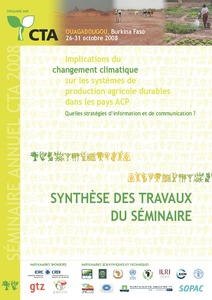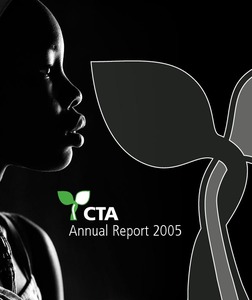The Eastern and Anglophone Western Africa Regional Assessment meeting was organized by a task force consisting of FAO, the United Nations Economic Commission for Africa, African Land Policy Initiative, the United Nations World Food Programme, United Nations Development Programme, the…
Le Séminaire a mis l’accent sur des aspects pratiques et des réponses concrètes que les communautés rurales des pays ACP y apportent ou peuvent apporter à court ou moyen terme.
Summary of adaption and mitigation strategies for reducing the effects of climate change especially with regard to better information and communincation management.
Soil loss is a major concern for land managers due to its influence on biomass production, surface water quality and landscape beauty. In Somalia, the risk of soil loss is accelerated by the removal of vegetation, bad land use practices and negative impacts of urbanization. The political…
Meeting symbol/code: 26, C 2009/INF/9
This publication presents finding of a rapid appraisal of institutions supporting livestock trade and marketing in Somalia. The study was carried to: identify institutions supporting livestock trade and marketing in the country; evaluate the roles played by these institutions in facilitating…
The present paper – the third in the HIV/AIDS Programme Working Paper Series – is based on field research conducted by two grassroots organizations – CINDI-Kitwe in Zambia and GROOTS Kenya in Kenya to map out and document cases of property grabbing from children, in particular those who…
The Pinheiro Principles provide restitution practitioners, as well as States and UN and others agencies, with a consolidated text relating to the legal, policy, procedural, institutional and technical implementation mechanisms for housing and property restitution. As such, the Principles…
The world’s mangroves 1980–2005 is a thematic study undertaken within the framework of the Global Forest Resources Assessment 2005. It was led by FAO in collaboration with mangrove specialists throughout the world, and was co-funded by the International…
Poverty in the Near East and North Africa region (NENA) is mainly a rural phenomenon. Almost half (48%) the area’s population lives in rural areas. This report focuses on key rural poverty issues in 13 diverse countries in the region, without attempting to propose policy or programme actions at…
As an organisation, we look forward to ensuring continuity of professional services to our partners and ACP beneficiaries in the coming years as well as continuing with existing endeavours and embracing new opportunities as they may arise.








